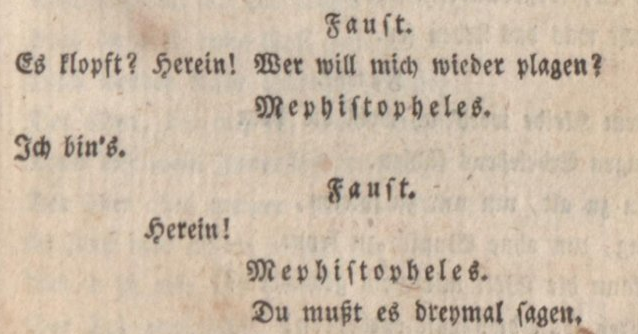Verses in Drama
Also in the case of dramas written in verse form, the speech is reproduced in <p> elements.
Verses in Drama

<sp who="#FAU"> <speaker><hi rendition="#g">Fauſt</hi>.</speaker><lb/> <p>Es klopft? Herein! Wer will mich wieder plagen?</p> </sp><lb/> <sp who="#MEP"> <speaker><hi rendition="#g">Mephiſtopheles</hi>.</speaker><lb/> <p>Ich bin's.</p> </sp><lb/> <sp who="#FAU"> <speaker><hi rendition="#g">Fauſt</hi>.</speaker><lb/> <p><hi rendition="#et">Herein!</hi></p> </sp><lb/> <sp who="#MEP"> <speaker><hi rendition="#g">Mephiſtopheles</hi>.</speaker><lb/> <p><hi rendition="#et">Du mußt es dreymal ſagen,</hi></p> </sp><lb/>
Source: Goethe, Johann Wolfgang von: Faust. Eine Tragödie. Tübingen, 1808. [Facsimile 103]
Interruptions of verses caused by speaker changes can be reproduced by linking the enclosing <p> elements using the attributes @xml:id, @prev and @next (see chap.: Interruptions of Related Text Components).
Attention: This form of deeper text processing was not applied to the works of the DTA corpus.
In contrast, rhymed passages or chants within a drama written in prose form are marked as verse groups (<lg>).